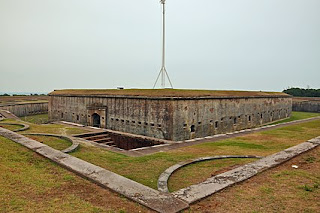Surrender of Fort Macon
Edgecombe Native Takes Fort Without
Fight
________
What led to
this quiet change of command?
 |
| Josiah Solomon Pender Taken from "Find A Grave" https://www.findagrave.com/memorial/42229086/josiah-solomon-pender |
There was
only one man on duty at Fort Macon in April 1861—William Alexander, 50 years
old, a 30-year veteran who had served gallantly in the Mexican War. His wife,
Ann L. Livesay Alexander, a Morehead City native, also lived at the fort.
Alexander knew trouble was on the
way. Other forts along the southern coast had been captured by state forces. He
was part of the Beaufort community, and he had heard the secessionist
rumblings. In fact, on April 2, Alexander wrote Col. H. K. Craig in Washington,
D.C. asking for a revolver for his protection. On April 12, the day the war
began at Fort Sumter in Charleston, S.C., Alexander learned from Col. Craig
that he was on his own. There were no revolvers available.
By the morning of April 14, Sgt.
Alexander had already received word that Pender intended to capture the fort.
He wrote Col. Craig again: “… A company of secessionists led by Josiah S. Pender
of Beaufort are today going to seize this fort …am at a loss how to act, in
premises, what to do, or where to go. I have served the US Army for the last
thirty years, and am now no longer fit for any active service, have my family
at the Post, and all of my property. The latter I expect to lose—having no
where to move it—and cannot at this time convert anything into money.”
When news of the Fort Sumter, SC
attack was telegraphed to Beaufort, Pender was ready to act. His company, along
with other local volunteers, boarded the Cora
for the short trip across Bogue Sound to Fort Macon. Sgt. Alexander had no
choice but to surrender. He and his wife remained at the fort to pack their
belongings and were removed to Beaufort on April 17. Alexander was ordered to
remain there to await orders. Those orders never came, and he remained where he
was until Union forces re-took Fort Macon in March 1862.
After Alexander’s surrender, the
triumphant Pender telegraphed S.C. Gov. Francis Pickens of his actions. He also
requested guns for the fort. Apparently, he did not notify N. C. Gov. Ellis.
State Takes Fort
It is not clear when Gov. Ellis learned
of the take-over of Fort Macon. However, on April 15, when President Lincoln
requested troops from N.C. and Ellis realized that the Union was ready to use
force against the South, a decision had to be made. Would N.C. fight with its
friends, neighbors and kinfolks, or against them? Gov. Ellis made the decision
and ordered the seizure of all federal operations within the state. The
Goldsboro Rifles, under the Command of Capt. Marshall Crafton, were ordered to
take Fort Macon. In short order, Crafton’s company and the newly formed
Goldsboro Volunteers [Wayne County] were on their way to Beaufort. The next
day, they assumed control of the fort from Capt. Pender.
 |
| Fort Macon today as taken from the shore. https://en.wikipedia.org/wiki/Fort_Macon_State_Park |
Pender’s volunteer company joined
the state forces on May 16 as Company G, Tenth NC Artillery with Pender as
their captain. After NC seceded, the unit became part of the Army of the Confederacy.
Pender’s son, Walter, only 17 years old, was a lieutenant in the Beaufort Harbor
Guards. He was accidentally shot the next year. Some say the accident happened
while he was instructing troops in the use of the bayonet. Another story is
that he was playing around when he was shot.
Pender was not entirely happy with
the situation after the state took over Fort Macon. On June 18, he tendered his
resignation unless he was given a better position. The letter, contained in the
William & Emmet Robinson Collection at Johnston Co. [NC] Heritage Center,
includes the following: “… I have been promised time & again … Men have
been promoted … neither practice nor theory in military matters. … I have submitted
to be ruled & insulted even by those that knew nothing in regard to their
military duties & in all human probability never will. …” The position he
wanted was that of Lieut. Col. of Artillery.
Pender did not resign, but there
were still problems. His wife was seriously ill in Beaufort; life at the fort
was dull. In November, when his request for leave was denied, he left without
permission. He falsely claimed that Gen. D. H. Hill had given him leave. He was
also accused of having taken items from the Union
with a forged requisition. A general
court martial at Morehead City found him guilty, and on 29 Dec 1861 he was
dismissed from the Confederate Army for “Conduct unbecoming an officer & a
gentleman.”
Col. Lawrence O’Bryan Branch wrote
of Josiah, “ … I know him to be brave, enterprising and intelligent, and
devotedly anxious for the success of the Cause. …” However, it is likely that
Pender was relieved to be free of the restraints of military life.
[Taken
from The Connector, Newsletter of the
Tar River Connections Genealogy Society, Vol. 8, No. 2, Spring 2004]

WexnusKbe_bi Nisha Jones Here
ReplyDeletefrigidarke